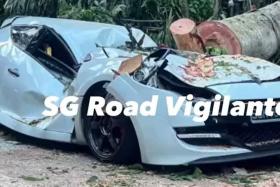Pofma correction orders issued to ex-GIC economist, TOC over false claims
Former GIC chief economist Yeoh Lam Keong and alternative news site The Online Citizen (TOC) have have been ordered under the fake news law to put up corrections over false and misleading statements about the loss made by the Housing Board in a Build-To-Order (BTO) project, as well as gains by the nation's past reserves.
The Protection from Online Falsehoods and Manipulation Act (Pofma) Office issued correction directions to Mr Yeoh and TOC, which require both to insert a notice against the original offending online posts or articles, with a link to the Government's clarification.
On Oct 4, Mr Yeoh published two Facebook posts referring to the reply by National Development Minister Desmond Lee to a parliamentary question by Non-Constituency MP Leong Mun Wai on HDB's net loss for the Central Weave @ AMK Build-To-Order (BTO) project. The minister had stated that HDB will incur a development loss of about $270 million for the project.
Mr Yeoh's posts stated that the reply was "a rather disingenuous and misleading analysis of the supposed $270 million loss made by HDB" and alleged that there was an "accounting sleight of hand" given that the Government "acquired most of the land at minimal or much lower cost by compulsory acquisition".
TOC subsequently carried an article on the same day echoing the points raised in Mr Yeoh's Facebook posts. The alternative news site also published another article the next day with a headline alluding to how Singapore's reserves will substantially profit from $500 million in land sales in the BTO project.
The Ministry of National Development said the losses incurred by HDB for the AMK BTO project are accurate and real, and that HDB's deficits are covered using funding from the annual Budget, which is raised from taxes and other revenue streams.
"Real money is involved, and this is certainly not an accounting sleight of hand," said MND.
The ministry said state land is part of the past reserves, and is not up to the Government to use as it wishes. HDB has to buy the land by paying fair market value for the land, and the money goes into the past reserves. Fair market value is determined by a chief valuer - a public officer whose appointment is agreed upon by the President - who uses the same valuation principles as professional valuers in the private sector.
MND said the Government cannot sell state land at nominal or much lower cost than its fair market value without the President's approval, as doing so would constitute a draw on past reserves.
"To consume past reserves at the expense of Singapore's future generations and security is populist and irresponsible. Our Constitution is designed to try to stop any Government from this kind of behaviour," it said.
The ministry added that neither the government nor the past reserves profit from land sales.
"When state land is disposed of at fair market value, there is no addition to the past reserves but a conversion of one type of asset (land) to another (cash)," it said.
The sum of about $500 million for the land for the Central Weave @ AMK BTO project, would not result in a net increase in the past reserves when deposited, said MND.
Get The New Paper on your phone with the free TNP app. Download from the Apple App Store or Google Play Store now



